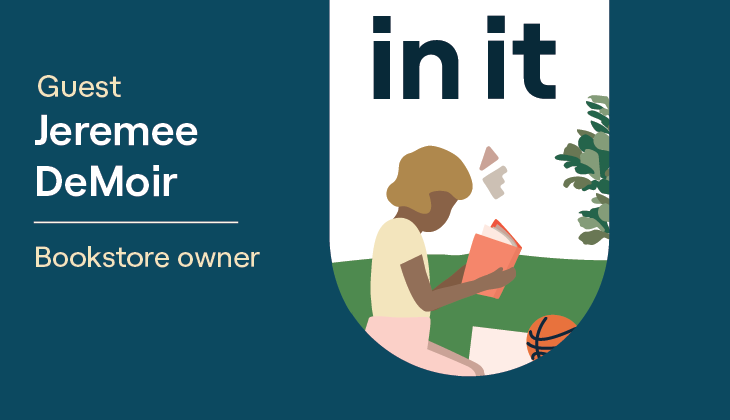Stay in the know
All our latest podcasts delivered right to your inbox.
Summer is a great time for kids to fall in love with reading. How can we make summer reading fun for all kids — even those who don’t think of themselves as readers?
In this episode, hosts Amanda Morin and Gretchen Vierstra talk about summer reading with Jeremee DeMoir, a bookshop owner and former teacher. Hear how Jeremee helps kids find reading materials that are engaging and accessible. Learn new ways to think about reading, and why you should consider things like audiobooks and manga. Plus, get Jeremee’s go-to reading recommendations for kids of all ages.
Reading recommendations mentioned in this episode
Naruto, illustrated and written by Masashi Kishimoto
Harold and the Purple Crayon, by Crockett Johnson
Books by Kacen Callender: King and the Dragonflies, Felix Ever After
The Hate U Give, by Angie Thomas
Books by Adam Silvera: Infinity Son, More Happy Than Not
The Poet X, by Elizabeth Acevedo
The Black Flamingo, by Dean Atta
Percy Jackson & the Olympians series, by Rick Riordan
Dog Man series, by Dav Pilkey
Willie Jerome, by Alice Faye Duncan
Related resources
Jeremee’s bookstore: DeMoir Books & Things
Check out Bookshare’s audiobook resource
Episode transcript
Amanda: From the Understood Podcast Network, this is "In It." On this podcast, we offer perspectives, stories, and advice for and from people who have challenges with reading, math, focus, and other types of learning differences. We talk to parents, caregivers, teachers, experts, and sometimes even kids. I'm Amanda Morin. I'm the director of thought leadership for Understood. And I'm a parent to kids who learn differently.
Gretchen: And I'm Gretchen Vierstra, a former classroom teacher and an editor here at Understood. And today we're talking about summer reading: why it's important, but also why it can and should be fun for your kids.
Amanda: But first, a little housekeeping. This is our last episode of this season of "In It." But don't worry, we'll be back in August, just in time for us all to get ready for the new school year.
Gretchen: In the meantime, we have a favor to ask. We want to know what topics you'd like us to cover the next season. Is there something you've been struggling with or wanting to celebrate that you think would be of interest to other folks who are in it? Send us an email at init — that's one word, I N I T — at Understood.org with your suggestions. [init@understood.org]
Amanda: And now, back to today's show.
Gretchen: OK. So summer reading. When I was a kid, I loved reading. But I hated summer reading assignments. I remember so clearly those long typed-up lists of books that the school would send us home with. Lists of titles that, for me anyway, did not spark joy. Instead, those lists reminded me it may be summer, but do you've still got homework to do.
Amanda: Oh, yep. I totally get that. But here's the thing, and I know that you know this, Gretchen: It doesn't have to be that way. Summer can be precisely the time that reading sparks joy and maybe even for the first time in your kid. So that's what we're after today. We're going to go rogue, get creative, and figure out what's right for every reader out there, even the ones who don't think of themselves as readers.
Gretchen: To help us with this, we're talking with Jeremee DeMoir, who's the owner of DeMoir Books & Things, a bookstore in Memphis, Tennessee.
Amanda: And Jeremee is a former middle school and high school teacher. And his bookstore is meant to be welcoming, especially to people of color like him, who may be seeking books that speak to their own experiences. I love that.
Gretchen: Yeah. Jeremee, welcome to "In It."
Jeremee: I'm so glad to be here. Thank you guys for inviting me.
Gretchen: So, before we dig in to how you go about recommending books to young readers, reluctant readers, and so on, I want to ask what comes to mind for you when you think of summer reading? Do you have strong memories of reading? By choice? Otherwise? What do you think? Summer reading.
Jeremee: Yeah, absolutely. So summer reading was so special to me. I — my fondest memories are always just like going to the library with my grandparents on the weekends. Or like the road trips across country and like having the really great book or we headed to the beach. And so I have really fond memories of summer reading. My journey reading started in utero. So when my parents found out they were pregnant, they literally just started reading to me in the womb. And so after I was here, it just became a daily thing. And so I grew up with this love of reading, and in the summer it just kind of blossomed. I finally had time to find something that I was so excited about reading.
Gretchen: Nice.
Amanda: I love that. I was telling Gretchen the other day that I was the kid at the library in the summer where the librarians were like, just take out more books than anybody else. You know, and I'm like, toting it home in, like, a little wagon kind of thing.
Jeremee: Yeah.
Gretchen: I remember cooling off in between the stacks. That was, you know, it was hot summer. And like in between the stacks, it was nice and cool and dark and that was a great place to read.
Jeremee: So yeah, I remember just having totes and totes of books in the summer, so it's always been a really cool thing. It's like you finally have the autonomy of choice to figure out what you are focused on instead of being handed a list.
Amanda: You may have like two different experiences as a teacher and now as a bookstore owner, right? What do you find are some of the things that may hold kids back from that falling in love with reading?
Jeremee: So I've seen it from both ends of the spectrum. As an educator, you often deal with children who have learning disabilities, such as dyslexia or just issues with focusing, ADHD, ADD. And so for them it's challenging finding pieces that work for them. But the beauty about it is that literature comes in so many different mediums. As an educator, we know that literacy is an umbrella, and so we know that it's not just reading, it's also speaking and listening. So we found audiobooks that might work for them. We find graphic novels where the text might be a little more chopped up to where it's more digestible. And so when you find something that kids can engage with that is super awesome to them, and then finding it in a medium that's accessible to them, then it becomes like this door that's being blown off the hinges and they're able to kind of find something that really fits them. Now as a bookseller, I get to take a journey with them instead of being like, OK, this is what you have, I can say, OK, so let me show you a whole new world, the Disney voice, you know what I mean? And so, uh —.
Amanda: Wait wait wait. Are you going to do it in the Disney voice for us?
Jeremee: Know, like, it's like a whole new world. Yeah. You get to hit all those wrong notes. I would never make it on stage, but that's fine. But you get to really have those moments with the kids in the store.
Gretchen: Yeah. I mean, if a kid comes into your store, right, and they're kind of like, oh, books are boring, I don't really want to read this summer, what's your go-to magic for that? Is it the whole new world?
Jeremee: Yes. My go-to magic is normally "Well, what kind of TV shows do you like?" And then they're like, "Well, I like Naruto." It's like, "Did you know that Naruto has a manga?" And it's like, "What's a manga?" "Did you know it's a Japanese comic book?" "It's a comic book?" And you're like, "Yeah, let me show you." And then you walk over and like, "Here, guys." And they're like, "Oh my God, I didn't know — ." And then it becomes a conversation about in the TV show, it did this and this, this and that, and then it's like, "Well, actually in this manga, it takes it a little bit deeper. You should check it out and see if it's something you like." And then they have a seat and start diving in. And then it's like, "Mom, Dad, hey, can I have this?" And then it becomes "I did not realize that actually this transfered." And so it becomes a moment where that light bulb blinks on for them.
Amanda: We're all former teachers here. So it's like one of the things you just said there that was so interesting to me is that comparison component of things, right? This happened in the TV show. This happens in the manga. This happens, like, I think those little lessons are embedded in there in ways that we don't think about sometimes. And I love that you just pointed it out.
Jeremee: Yeah. I always feel like once an educator, always an educator. And so I still have those moments. It becomes a conversation with the child and then also with their parent or guardian that's with them. It's like, hey, so it's OK for them to watch TV because literacy is also visual. It's also a visual thing. So like, oh, wow. So it opens up these beautiful conversations about what literacy can mean and how it can change and develop.
Amanda: That's great. So Jeremee, what are some of your go-to recommendations? Let's start with like little kid books or beginning readers.
Jeremee: Yeah, with the little ones, it's always of course, I don't know if you guys knew this or not, but there are actually a lot of Baby Shark books, which is so crazy. I don't know if you guys remember, like, the little Golden Books.
Gretchen: Yeah, I love Golden Books.
Jeremee: Yeah. So Golden Books, they have like a lot of the Baby Shark books. And so I always recommend those and the little ones, they go crazy because for whatever reason, it's like seeing Britney live, you know, in the '90s, how Britney was just this phenomenon. It's like Baby Shark is everywhere. So they their eyes light up. And so I recommend that for a lot of the little ones. And then when it kind of goes to like or elementary, of course, a lot of the classics like "Harold and the Purple Crayon," or "Little Bill," or just so many different kinds. And then by the time they get to middle grades, I start to kind of shift the recommendations to kind of make them all inclusive. So stories like "King and the Dragonflies" by Kacen Callender. It's a really beautiful novel, and it talks about this little 12-year-old, 13-year-old boy who's experiencing grief. And so he's dealing with coming to terms with like the loss of a sibling while also growing up in the South, while also dealing with emerging sexual feelings towards the same sex, while also trying to deal with racism in the city. So it tackles a lot of different things that kids today are going through. And so it starts new conversations. And so by the time they go from there and then end up in high school, it becomes more of them trying to find escapism. The kids are extremely exhausted and they're just trying to escape the high school requirements of literature and what that looks like. And so it's like we're finding books like "The Hate U Give" by Angie Thomas. A lot of kids have really been enjoying the Infinity Son saga or "More Happy Than Not" by Adam Silvera. But they're really buying in to literature because they're able to see themselves not just like in the ethnicity of that character, but also in the stories themselves.
Amanda: Don't worry if you're trying to scribble down all of these names of books and authors and things like that. We're going to put them in the show notes for you, so you don't have to keep track right now. Can we talk for a minute about the word "literature," actually, because that — Gretchen, I'd love your opinion, too, because you were a middle school teacher. I always think we hear the word "literature" and we think it has to be lofty and it has to be, you know, classic and all of these things. I really want to know how both of you were defining that.
Jeremee: Yeah. Gretchen, I'd like to hear your thoughts first, before I dive in.
Gretchen: Something Amanda and I were talking about what we were wanting to do this show was to really help families understand that literature is super expansive. And that just because something might not be a classic or something might not be that long, it's still literature, right? I always tell my daughter who loves to write and she writes lengthy things all the time. And I say, "You know what? It actually takes a lot of skill to write something really short, you know?" So, I mean, there is beauty and there is literature value in a graphic novel where the dialog has been written to really reflect the characters. So I expand that definition definitely to all sorts of texts.
Jeremee: Absolutely.
Gretchen: What about you, Jeremee?
Jeremee: Yeah, I do the same. For me, it is anything that you can consume that starts in a written form. And so that's how I define that. And so that encompasses everything. It encompasses haiku. It encompasses odes and free verse. It encompasses short stories, novellas. Like there are so many different things that literature falls under. And I always use as a very perfect example of a very short story that is so powerful: "The Yellow Wallpaper."
Gretchen: Oh, I love that.
Amanda: I love that.
Jeremee: You know, and it's like literally, it's literally, what, 14, 16 pages of just incredible descriptive language, incredible dialog, incredible internal conflict. And it's just like it literally can be so tiny but yet so impactful.
Gretchen: Oh, yeah. I think people forget about short stories sometimes. And I used to when I taught in the middle school, I loved using short stories because they were short and accessible and an easy way to kind of dig in to literature.
Jeremee: Yeah, absolutely. There are so many. And like I personally — I probably shouldn't say this — but I hate teaching poetry because I don't necessarily like poetry unless it's free verse.
Amanda: I'm with you there.
Jeremee: But one thing that I've been trying to kind of like help kids understand is that haikus are like your best friend. You know, typically it's three lines and you're done and they're — it's just like, hey, if you doing a poetry assignment, do a haiku. Like three lines, call it a day. Or do an ode because it's not as big as like either. So it's like knowing that there's is variety.
Amanda: Well, and I think poetry is being so redefined, I think right now, right, in a lot of ways. I think about Amanda Gorman is really redefining poetry. Cleo Wade is doing some great stuff that's poetry. And I think those are the things that I'd love to start introducing kids to is that it doesn't have to be that classic verse. It can be that free form. It can be telling your story in these interesting ways, too.
Jeremee: Yeah. And then there's even a YA book, "The Poet X." It's a story written in verse. Or "The Black Flamingo" by Dean Atta. Like these are narrative stories written through verse and it's just changing the way — kind of like to your point, Amanda — like a change in the way that you can define literature and still have it be really impactful.
Gretchen: One thing I wanted to mention, Jeremee, about picking out books and having, you know, your idea of how you spark reading in kids and get them in the bookstore and how you help them pick things out, is I want our listeners to know how important it is to actually rely on booksellers and librarians. Because that's what I used to do as a teacher, because I certainly couldn't read all the books that my students were reading. And if someone asked me for a recommendation, I would go to our school librarian, who had read everything in there and said, you know, "Here's this child's interests. What do you recommend to them?" And so over the summer, families can go to libraries and they can also go to booksellers like you and find out what you might recommend. Because I'm sure you've read a ton.
Jeremee: Yeah. You sure can, absolutely.
Amanda: Road trip, road trip, we're all going on a road trip to Jeremee's store.
Jeremee: Absolutely.
Amanda: Well and I think both of you touched on this a little bit, and I want to jump in and mention it too, that in our house, audiobooks are a really big hit. I have a child with ADHD. I have a husband with a language-based learning disability, and both of them find it hard to sit down and read through a book. But we do what we call ear reading, right? They're reading the audiobooks while I'm reading it in the paperback.
Jeremee: Yeah.
Amanda: And then we can have great discussions about it. And it's really interesting, like even the things where I'm pronouncing a character's name a certain way because I read it a certain way, and then they're actually able to say to me, "Well, this is the way the narrator is telling me what that character's name is." It's like a whole new perspective and it's still reading.
Jeremee: Absolutely. I think as adults, we forget that a lot of times for us, the first time we encounter a book is at bedtime when our parents reading to us, right? And so it's like, is that child reading? Yes, because they're listening to you give them the words, giving them the vocabulary. And, you know, and so for me, I have a goddaughter who's dyslexic. And so what helps her are audiobooks that she's only allowed to purchase from my bookstore. But not literally, it literally helps her. She's able to hold the book in her hand and hear the words as she's trying to figure out what those things do. And so it becomes like this really cool thing where I don't have to feel shame about not being able to understand what's on the page because I'm still able to follow along and track it. And so that's a huge win for her, but also a huge win for family, because we all get to hear this at the same time and having conversations about, "Wow, did you hear what they just said?" Or "Did you see that?" So it becomes this really wholesome moment.
Amanda: Can you tell me how you would go into a bookseller and ask for an audiobook? I don't think I've ever done that.
Jeremee: So some booksellers have like Libro subscriptions. And so Libro's like this audio service that allows partnerships with bookstores where they get a percentage of your audiobook purchase. Or, if you are like my mom, you still have actual CDs that you like to put in your CD player in your car. Certain publishing houses will still make those compact discs that you can actually order for your bookstore.
Gretchen: That's nice. You talked a little bit about finding books that reflect kids' experiences, you know, whether it's race, ethnicity, sexuality. Have you come across books that do a good job of portraying characters with learning and thinking differences?
Jeremee: Oh yeah. The Percy Jackson series. "Percy Jackson and the Lightning Thief." That whole entire saga is geared towards a kid who we all thought had dyslexia. But come to find out, he's actually a god and he just perceives language different. But yeah, there are so many different books that touch on there. Specifically for like other things, it's as simple as going into a catalog and just searching those keywords and finding something that might relate.
Amanda: Yeah, I'll pop in and recommend the Dog Man series, the Dav Pilkey.
Jeremee: Yes.
Amanda: Yeah. Like the robot is literally named 80-HD, and Dav did that on purpose because he, you know, he also has ADHD. Those have been a big hit in our house, too.
Jeremee: There's so many different titles these days that address all kinds of things, and it's just as easy as literally going into a catalog and just typing the keyword. And then it becomes like, you know what, I didn't know about this book before, and now I do. So let's talk about it. It's a learning moment, and as a bookseller, my whole thing is always about learning. It's all about being a voice and not an echo. That's something that I make sure we say all the time: Let's be a voice, not an echo. So influence us and encourage us and kind of help us learn about your differences, you know?
Gretchen: So books changing lives, Jeremee. We know that not everybody, though, has access to buy books all the time, right? So you're a bookseller, but what can you recommend for families? How to think a little bit outside the box when it comes to acquiring a summer reading library.
Jeremee: So outside of course, like your local branches of libraries, there are different literacy or literary-based organizations whose whole job is giving away free books. And then some bookstores also carry like free literacy programs where that is a thing. And so it's just about like not necessarily finding those options, but your local library is always a starting source. And then your next best friend is Google, literally Googling "free books near me." That's a huge, easy way, you know, of finding it. But those are two of the ways in which you can do that. And if you live in the South or live in the Shelby County area, DeMoir Books & Things, we have a free literacy program, you know, where kids 0 to 17, regardless of if you buy a book or not, you come in the store, you don't leave empty-handed. We have thousands of books that are just readily available where you can grab and go. Because our whole job is book accessibility and promoting a love of reading and writing. As a member in society, you cannot survive what is very, very hard to survive if you can't read. And so people don't realize how expensive books are. And so it costs a bit of nothing to just give a free book to somebody. For adults who maybe can't afford a particular book, we offer discounts for that, too. Of course, keeping the lights on is important. Paying the mortgage is important. But what are you doing for the next generation? What is your legacy?
Amanda: I'm coming in as an author to say like if there's a book that — you know a local author and you want to read it, ask them if they have author copies. Because they probably do that they'd be willing to provide to you. So I think that's important, too. Book swaps.
Gretchen: Book swaps.
Amanda: In our middle school the kids are doing book swaps, right? They'll bring in the books that they're done reading and they'll swap out for each other's. I'm just gonna add those in as a couple of other ways that I think people can access books.
Gretchen: And sometimes libraries have sales of their old books, you know, that are like slightly torn or a little bit damaged. And then they sell them for a dollar or two and to raise money for the library. Those are great resources.
Jeremee: And sometimes they'll give 'em away for free, especially during weeding season. So like for people that aren't familiar, libraries, just like a gardener weeds in their garden, they're taking out things. They would do that for books too. Books that might not be as popular anymore, that aren't circulating. They'll just give those away. Sometimes they don't necessarily talk about it. So this is a secret. Don't tell anybody. But no, but seriously, tell everybody. I tell everybody. Just go to the library. Like, hey, are you guys weeding yet? Weeding. And sometimes we're like, yeah, we are. Would you like to see?
Gretchen: Yeah. Awesome. I have a feeling you have something good for this. So, a family wants to get going on helping their kids, you know, read more this summer. What's your easiest, simplest piece of advice?
Jeremee: My simplest piece of advice is ask your kids what they like. Kids just want to know that they're included in the decision making. And so that's my greatest advice. Ask them what they like and then find it. If your kid loves soccer, then find them Christian Ronaldo books, or find them whatever soccer story that they like. There are so many books for that. For like tennis, did you know there are like 15 Serena and Venus Williams books for kids? You know, if they like drawing, find them books that deal with that. Anything that your child likes, I promise you, there's a book out there that talks about this subject.
Gretchen: Awesome. Thank you so much for being with us, Jeremee.
Jeremee: It has been a pleasure. This has been great.
Amanda: Thank you so much. I think we're all going to go off and read all the books now.
Gretchen: Jeremee's bookstore is called DeMoir Books & Things. That's D E M O I R. His store's in Memphis, Tennessee. And if you're in the neighborhood, stop by and say hello.
Amanda: And as we mentioned earlier, we'll have a list of all the books we talked about today in our show notes. And I want to give a special shout-out to the Percy Jackson series. I actually had the pleasure of breaking down all the dyslexia and ADHD references in the first book from that series on a podcast called The Newest Olympian, hosted by Mike Schubert. It was so much fun. So if you want to do a deep dive, go check that out. You've been listening to "In It" from the Understood Podcast Network.
Gretchen: This show is for you. So we want to make sure you're getting what you need. Email us at init@understood.org to share your thoughts or to share a story about your own experience with summer reading. We love hearing from our listeners.
Amanda: You can also email us your ideas for season four since, as we mentioned at the top of the show, we're about to get busy planning for that.
Gretchen: Understood is a nonprofit organization dedicated to helping people who learn and think differently discover their potential and thrive. Learn more at Understood.org/mission.
Amanda: "In It" is produced by Julie Subrin. And thanks to Sara Ivry, who always finds such great guests for our show. Briana Berry is our production director. Andrew Lee is our editorial lead. Justin D. Wright mixes the show, and Mike Errico wrote our theme music. For the Understood Podcast Network, Laura Key is our editorial director, Scott Cocchiere is our creative director, and Seth Melnick is our executive producer.
Gretchen: Thanks for listening. We hope you have a great summer filled with lots of pleasurable summer reading.
Amanda: And thanks for always being in it with us.
Hosts

Gretchen Vierstra, MA
is the managing editor at Understood and co-host of the “In It” podcast. She’s a former educator with experience teaching and designing programs in schools, organizations, and online learning spaces.
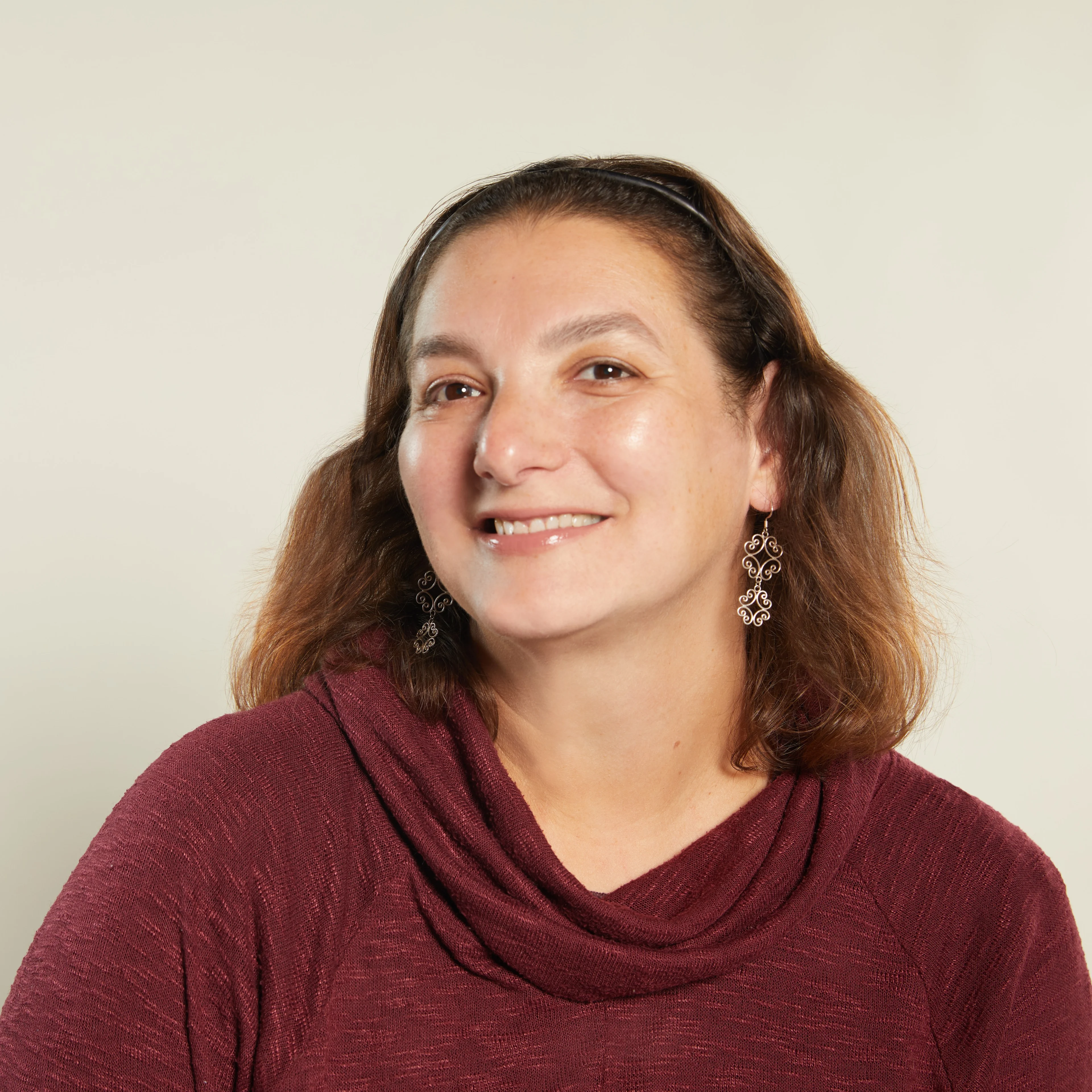
Rachel Bozek
is co-host of the “In It” podcast and the parent of two kids with ADHD. She has a background in writing and editing content for kids and parents.
Latest episodes
April 25, 2024
Learn about common reasons families might look for a special education attorney and what their other options are.
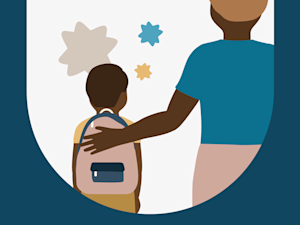
April 11, 2024
Learn ways to advocate for your child at school while maintaining a good relationship with their teachers.
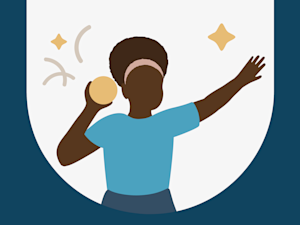
March 28, 2024
The track and field gold medalist shares her story and talks about ADHD, dyslexia, and building confidence.

March 14, 2024
The hosts interview kids’ book author Lindsey Rowe Parker. She talks about her new picture book about sensory differences in kids.
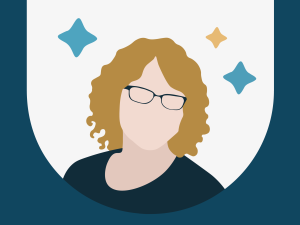
February 29, 2024
Understanding what a language disorder means for your child can be overwhelming. Here’s help from an expert.
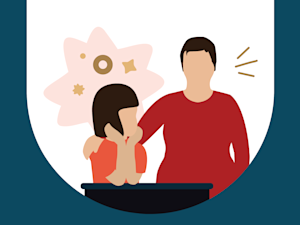
February 15, 2024
Talking with your child about their diagnosis of a learning and thinking difference can be tough. Get advice from an expert.
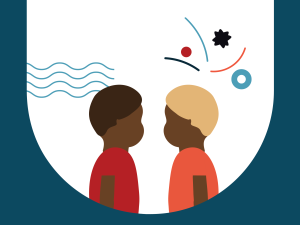
February 1, 2024
How can you manage the challenges of having one child who learns and thinks differently and one child who doesn’t? Get advice from an expert.
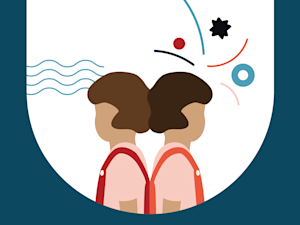
January 18, 2024
Any sibling relationship can be hard to manage. But what happens when one of the siblings has a learning or thinking difference? Here’s one mom’s story.

January 4, 2024
Overwhelmed by talking with your child’s pediatrician about ADHD or learning differences? These tips can help.
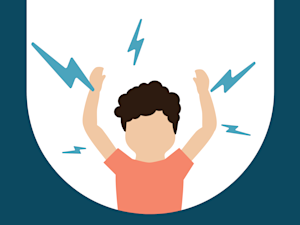
December 14, 2023
Tantrums and meltdowns are challenges all parents face. Get tips for projecting calm when kids and teens have tantrums.
